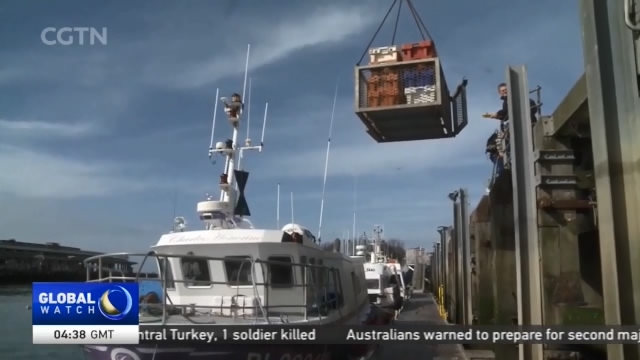
13:46, 23-Mar-2018
Brexit Talks: Brexit impact on ports economy a major issue for EU

Brexit talks continue to take centerstage, as EU leaders gather and are expected to sign off on a transition deal announced on Monday. But it's still not clear what sort of trading relationship Britain and the EU would be transitioning to - leaving ports that rely on cross-Channel trade increasingly worried about their economic future. Elena Casas reports from Dunkirk in northern France.
A fresh catch of sole, cod and sea bass sails into port in northern France, but 70 to 80 percent of it has been caught in British waters.
Fishing has become an emotive issue in Brexit talks - in the 2016 referendum, fishermen in the UK overwhelmingly voted to leave, wanting to escape EU quotas that limit what they're allowed to catch.
But fishermen here say their industry depends on being able to fish in British seas.
STEPHANE PINTO, VICE PRESIDENT REGIONAL FISHING COMMITTEE OF THE PAS-DE-CALAIS "The British might use Brexit to reject the quotas set by the rest of Europe, that might give them substantial leverage to push back against the quotas that weigh on them now."
On Monday, Britain and the EU agreed the UK will have the right to decide who fishes in its waters after 2020.
ELENA CASAS DUNKIRK, FRANCE "The future of these fishing boats depends on the outcome of talks in Brussels. The EU 27 has insisted Britain will stick to current fishing quotas during the transition period - but British ministers say that afterwards, they will take back control of British waters."
This coastal area was hard hit by deindustrialisation and already has high unemployment. Dunkirk hopes to create jobs with a 900 million dollar upgrade to its cargo port, which already handles over 100 lorries a day.
But port officials are worried by the British government's plan to leave the EU customs union after Brexit. They say a two minute delay at customs here would cause a traffic jam 27 kilometres long - and that would mean shortages of fresh produce on British supermarket shelves.
KASPER MOOS, CHIEF OPERATING OFFICER DFDS FERRIES "We will potentially have traffic hanging around, not able to cross the border, and looking at the infrastructure that has been built, looking at how the supermarkets in the UK are dependent on having traffic flowing in every single day, those delays will be noticeable, obviously."
If a transitional deal is signed off in Brussels this week, the port will have until December 2020 to get systems in place to stop the new checks grinding traffic here to a halt.
The long term future of the port will depend on what kind of trading relationship Britain has with the EU after that date - and talks on that have still yet to get into gear. Elena Casas, CGTN, Dunkirk, France.

SITEMAP
Copyright © 2018 CGTN. Beijing ICP prepared NO.16065310-3
Copyright © 2018 CGTN. Beijing ICP prepared NO.16065310-3